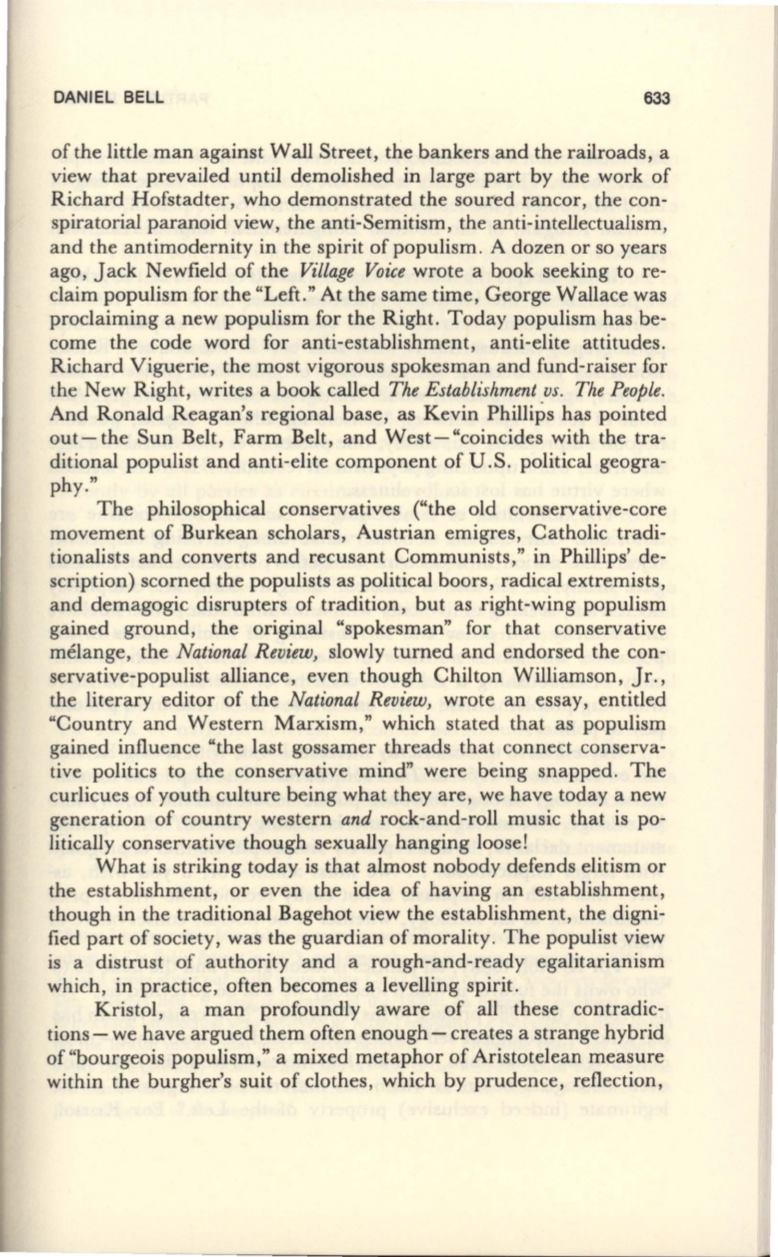
DANIEL BELL
633
of the little man against Wall Street, the bankers and the railroads, a
view that prevailed until demolished in large part by the work of
Richard Hofstadter, who demonstrated the soured rancor, the con–
spiratorial paranoid view, the anti-Semitism, the anti-intellectualism,
and the antimodernity in the spirit of populism. A dozen or so years
ago, Jack Newfield of the
Village Voice
wrote a book seeking to re–
claim populism for the "Left." At the same time, George Wallace was
proclaiming a new populism for the Right. Today populism has be–
come the code word for anti-establishment, anti-elite attitudes.
Richard Viguerie, the most vigorous spokesman and fund-raiser for
the New Right, writes a book called
The Establishment vs. The People.
And Ronald Reagan's regional base, as Kevin Phillips has pointed
out- the Sun Belt, Farm Belt, and West- "coincides with the tra–
ditional populist and anti-elite component of U.S. political geogra–
phy."
The philosophical conservatives ("the old conservative-core
movement of Burkean scholars, Austrian emigres, Catholic tradi–
tionalists and converts and recusant Communists," in Phillips' de–
scription) scorned the populists as political boors, radical extremists,
and demagogic disrupters of tradition, but as right-wing populism
gained ground, the original "spokesman" for that conservative
melange, the
National Review,
slowly turned and endorsed the con–
servative-populist alliance, even though Chilton Williamson, Jr.,
the literary editor of the
National Review,
wrote an essay, entitled
"Country and Western Marxism," which stated that as populism
gained influence "the last gossamer threads that connect conserva–
tive politics to the conservative mind" were being snapped. The
curlicues of youth culture being what they are, we have today a new
generation of country western
and
rock-and-roll music that is po–
litically conservative though sexually hanging loose!
What is striking today is that almost nobody defends elitism or
the establishment, or even the idea of having an establishment,
though in the traditional Bagehot view the establishment, the digni–
fied part of society, was the guardian of morality. The populist view
is a distrust of authority and a rough-and-ready egalitarianism
which, in practice, often becomes a levelling spirit.
Kristol, a man profoundly aware of all these contradic–
tions- we have argued them often enough- creates a strange hybrid
of "bourgeois populism," a mixed metaphor of Aristotelean measure
within the burgher's suit of clothes, which by prudence, reflection,


